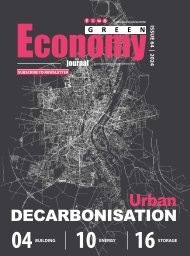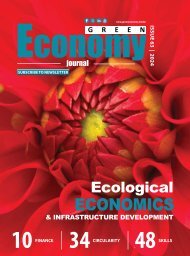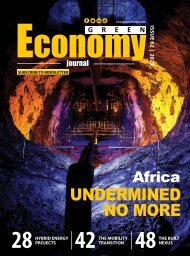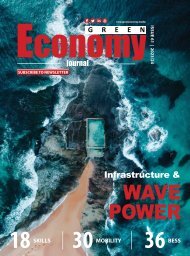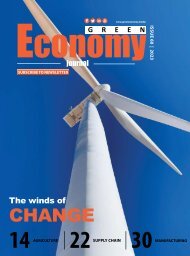Green Economy Journal Issue 58
You also want an ePaper? Increase the reach of your titles
YUMPU automatically turns print PDFs into web optimized ePapers that Google loves.
MOBILITY<br />
e-Micromobility can<br />
DRIVE SA CITIES INTO THE FUTURE,<br />
starting in Rosebank, Joburg<br />
While other countries are leading the charge with electric vehicles and renewable energy,<br />
South Africa languishes in a power crisis and EVs on a mass scale seems like a pipe dream.<br />
BY ANDILE SKOSANA, CITYCONSOLIDATOR.AFRICA<br />
The revolution is coming and South Africa will have no choice<br />
but to keep up. The ideal is a country, and cities, that are built<br />
around sustainability and e-mobility, and, we would strongly<br />
argue, e-micromobility. But the question is how do we get there?<br />
This is how the Rosebank e-Micromobility Pilot Project was born<br />
– a small public-private partnership that goes down to the most<br />
granular level. Fifteen electric delivery bikes working within the<br />
Rosebank Management District precinct, sharing the same solarpowered<br />
charging kiosk that doubles as a battery-swapping centre.<br />
But why e-bikes, why e-micromobility? South Africa’s roads are<br />
built for cars and trucks. It would be no exaggeration to proclaim that<br />
they are unsafe for e-bikes. Despite the proliferation of delivery bikes<br />
in our suburbs. However, this is where we are, not where we want to<br />
be. It should not be that one 75kg person starts up a two-ton internal<br />
combustion vehicle to travel 3km to buy a litre of milk. Two-wheelers<br />
take up less space, they are more environmentally friendly, more<br />
manoeuvrable, more cost-effective and ultimately quicker because<br />
of their convenience. Most importantly, they are more inclusive in<br />
bringing more people into mobility generally. Introduced sustainably,<br />
an e-micromobility ecosystem will make for friendlier streets.<br />
Delivery bikes present a solid anchor point from which to enter<br />
the e-micromobility discussion. Since Covid-19, e-commerce has<br />
skyrocketed and will grow by 40% through 2025. This is one of the<br />
only growing segments in the economy now, and yet there is policy<br />
silence around the use of delivery e-bikes in cities. Where should they<br />
park? What are the rules for training drivers? What are the set standards<br />
and regulations? None of these questions can be answered, yet these<br />
e-bikes are integral to our suburban and inner-city lives. There needs<br />
to be rigorous thinking and planning around influencing policy<br />
for the sector because we can shape the growth of the sector to<br />
deliver convenience to other parts of the city and even the townships.<br />
The pilot project talks directly to this glaring need. If we can build a<br />
viable and safe e-micromobility ecosystem for delivery bikes, the next<br />
step is to add commuter and personal recreational mobility to the<br />
same ecosystem.<br />
A project like this cannot exist without massive buy-in. The private<br />
sector-led project has the support of the Rosebank Management<br />
District, Transport Authority Gauteng, the City of Johannesburg<br />
represented by transport, development and planning, the JRA<br />
and the Smart Cities office. The Gauteng Department of Economic<br />
Development is interested in issuing riders from Alexandra. The<br />
private sector has been equally welcoming in the form of secondlife<br />
storage battery business REVOV, SeeSayDo, Solid<strong>Green</strong>, Mzansi<br />
Aerospace Technologies as an accelerator, and Evo Motors will<br />
provide e-bikes and <strong>Green</strong> Riders e-bikes and training. The list of<br />
stakeholders grows daily.<br />
The outcome will be an applied research case study that delves<br />
into metrics to do with every aspect of the ecosystem, as well as<br />
concept notes to influence policy. Gauging the performance of<br />
the pilot will generate insights into e-bike and rider performance,<br />
delivery metrics, carbon savings and much more. The concept<br />
notes will include submissions to support the Transport Authority<br />
Gauteng’s 2030 Smart Mobility strategy, a concept note on a green<br />
mobility credentials and universally-standard swappable battery<br />
ecosystems as well as precinct infrastructure and management<br />
protocols for e-micromobility.<br />
e-Micromobility provides South Africa with an opportunity to<br />
catapult our cities into this new world, where they are not only more<br />
economically viable but also more inclusive of people’s needs. Building<br />
a world-class African city is the objective which will be achieved with<br />
a bottom-up approach that lays the foundation for scale, responsive<br />
policy and ultimately mass buy-in. This bottom-up approach might<br />
start small but will grow to make “rands and sense”, changing the face<br />
of our cities together.<br />
WHAT<br />
WE DO<br />
Local<br />
Procurement<br />
International<br />
Chemical<br />
Procurement<br />
Local Logistics<br />
Cross Border<br />
Logistics<br />
End to End Logistics<br />
of Copper Concentrate<br />
through Africa<br />
Sea Freight<br />
We are a Zijin owned subsidiary, with multiple mining clients mainly in the Democratic<br />
Republic of the Congo.<br />
Our company specialises in supplying mining equipment, steel, and<br />
consumables to our clients<br />
We specialise in cross-border logistics throughout Africa<br />
38<br />
20 Woodlands Dr, Woodmead, Johannesburg, 2191 | 010 449 2272




